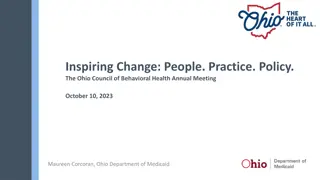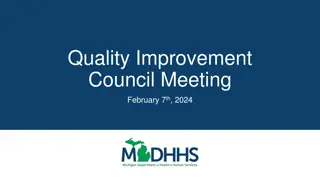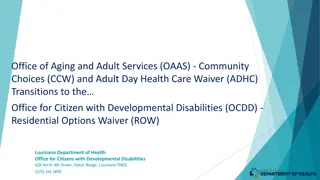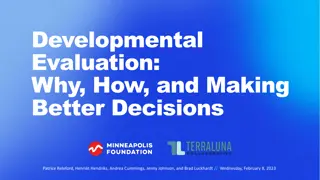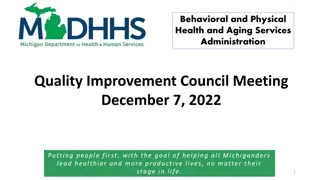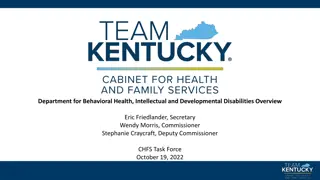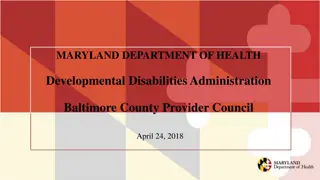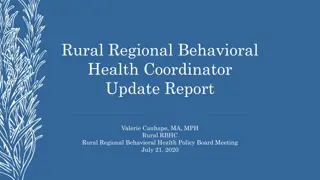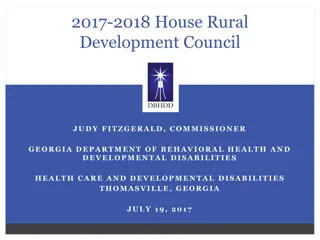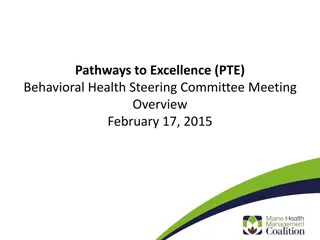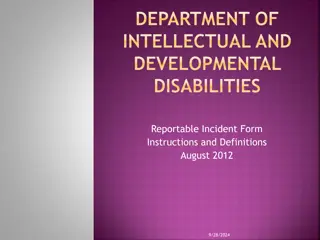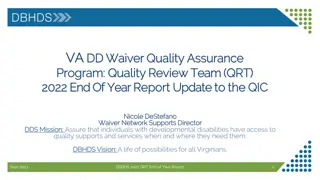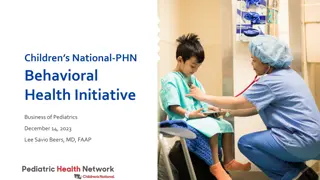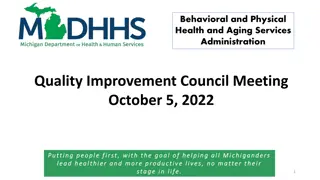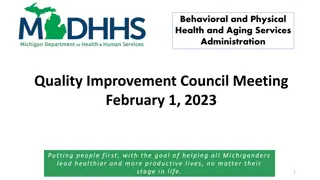Behavioral Health and Developmental Disabilities Administration Quality Improvement Council Meeting - December 1, 2021
The Behavioral Health and Developmental Disabilities Administration Quality Improvement Council met on December 1, 2021, focusing on putting people first to help all Michiganders lead healthier and more productive lives. The meeting agenda included welcome and introductions, updates from BHDDA, workgroup updates, discussion on promising practices, and closing remarks. Updates covered areas such as alcohol and drug abuse treatment, evidence-based practices, federal compliance, community-based services, and innovation projects. Workgroup updates highlighted the Conflict-Free Access and Planning initiative aimed at improving the lives of those served.
Download Presentation

Please find below an Image/Link to download the presentation.
The content on the website is provided AS IS for your information and personal use only. It may not be sold, licensed, or shared on other websites without obtaining consent from the author.If you encounter any issues during the download, it is possible that the publisher has removed the file from their server.
You are allowed to download the files provided on this website for personal or commercial use, subject to the condition that they are used lawfully. All files are the property of their respective owners.
The content on the website is provided AS IS for your information and personal use only. It may not be sold, licensed, or shared on other websites without obtaining consent from the author.
E N D
Presentation Transcript
Behavioral Health and Developmental Disabilities Administration Quality Improvement Council Meeting December 1, 2021 Putting people first, with the goal of helping all Michiganders Putting people first, with the goal of helping all Michiganders lead healthier and more productive lives, no matter their lead healthier and more productive lives, no matter their stage in life. stage in life. 1
AGENDA 1. Welcome and Introductions (10:00-10:10) 2. BHDDA Updates (10:10-10:20) 3. Workgroup Updates (10:20-11:00) 4. Promising Practices Discussion NCI Data (11:00-11:55) 5. Closing Remarks (11:55-12:00) 2
Welcome and Introductions Overview of new meeting format Request for feedback Refreshing membership Participation: 1.MDHHS 2.PIHPs 3.CMHs 4.Other agencies 5.Beneficiaries and advocates 3
BHDDA Updates Jackie Sproat (Division of Contracts and Quality Mgmt.) 1. Initiation and Engagement of Alcohol and Other Drug Abuse or Dependence Treatment (IET) measure data validation work required by PIHPs for FY22 Mary Ludtke (Division of Mental Health Services to Children and Families) 1. Evidence-Based Practices (EBPs) that are being supported for children, youth and families 4
BHDDA Updates (continued) Lyndia Deromedi (Federal Compliance) 1. Home and Community Based Services Status/Updates 2. 1915(i) SPA Status/Updates 3. 1915(c) Waivers (HSW, CWP, SEDW) and Autism Services Updates 4. Federal Compliance Section Initiatives: SIS-A, Person Centered Planning Fidelity work and Quality Reviews 5. Site Review Updates 5
BHDDA Updates (continued) Brenda Stoneburner (Community Based Practices and Innovation) 1. Improving MI Practices updates: Home | Improving Mi Practices 2. Michigan Fidelity and Assistance Support Teams (MIFAST) FY22 Priorities 3. New Evidence Based Practices (EBPs) planned for implementation and training possibilities 4. Walking with Warriors Project Updates, Challenges and Opportunities 6
Workgroup Updates: Conflict-Free Access and Planning Overview of recent activity: Kickoff meeting for new Conflict-Free Access and Planning (CFAP) workgroup will be in January. Workgroup will be led by BHDDA and supported by TBD Solutions. This work was formerly labeled Conflict-Free Case Management. How this work improves lives of people served (quality): This work will give people served increased freedom to choose from a variety of service providers. Impacts on PIHP or CMH operations: As an outcome of this meeting series, MDHHS will create new policies to safeguard against conflict-of-interest. Next steps: Kickoff meeting will take place next month. Questions? 7
Workgroup Updates: SIS Steering Committee Overview of recent activity: renewal of the MDHHS contract with American Association on Intellectual and Developmental Disabilities suspended the pursuit of SIS-Child implementation eligible age group expanded to include age 16 and older How this work improves lives of people served (quality): used to enhance and support the person- centered planning process. provides a standardized framework that assists in understanding support needs and maximizes potential for full participation in the community. Impacts on PIHP or CMH operations: completed by Independent assessors who are free of conflict of interest assessor capacity information from the SIS can assist with decision-making and helps ensure that the public behavioral health system provides for the needs of individuals in an equitable way Next steps: determining completion rate thresholds exploring how SIS data can be used Questions? 8
Workgroup Updates: Comprehensive Quality Strategy Overview of recent activity: In 2020, MDHHS completed a draft quality strategy that is currently under Federal review. This draft is publicly available. It outlines quality goals for all of Michigan s Medicaid Managed Care programs through 2023. How this work improves lives of people served (quality): The strategy includes goals that will have a direct impact of people served, including focus on access, racial equity, person-centeredness, care coordination and improving outcomes. Impacts on PIHP or CMH operations: Over time, BHDDA will create new policies and launch new quality initiatives to support these goals. Next steps: MDHHS staff are currently reviewing each programs status with quality strategy goals and necessary steps to close gaps between current and envisioned states. Questions? 9
Workgroup Updates: Licensed Residential Tiered Rate Workgroup Overview of recent activity: 10/15 most recent meeting to determine an assessment instrument to support IPOS determination of residential primary engagement hours, process for standardizing review of IPOS and assessment data, analyzing SIS assessment and encounter data to inform # of tiers for I/DD population. How this work improves lives of people served (quality): driven by the PCP process in identifying support needs in a consistent manner statewide. Impacts on PIHP or CMH operations: establishes a fee schedule for licensed residential settings Next steps: Meeting scheduled for 1/21/22 Questions? 10
Workgroup Updates: Developmental Disabilities Practice Improvement Team (DD-PIT) Overview of recent activity: Provide critical, external advice and recommendations to the Behavioral Health & Developmental Disabilities Administration (BHDDA)/Quality Management & Planning (QMP) Division How this work improves the lives of people served (quality): Individuals with developmental disabilities have the right to live independently, to exert control and choice over their own lives, and to participate in and contribute to their communities through full integration and inclusion in the economic, political, social, cultural, and educational mainstream of United States society. Advise and make policy recommendations to empower people with developmental disabilities and their families Focus on person centered planning, self-determination, and family and youth guided principles Issues include short and long-term planning of behavioral health policy, resources, practice, technical assistance, community outreach and education information Impact on Individuals who receive supports: To review proposed policies, programs, and results from BHDDA/QMP activities and offer BHDDA advice on how to improve quality. Next steps: Share and raise awareness of the initiatives, resources, and best or promising practices to support people with developmental disabilities and their families across Michigan. Questions? 11
Workgroup Updates: National Core Indicators Advisory Council Overview of recent activity: This council meets to review NCI data and discuss implications for service delivery to Michigan s IDD population. No recent activity, although the next meeting will take place next month. How this work improves lives of people served (quality): NCI data tells us how people served with IDD perceive their quality of life in multiple areas including community inclusion, choice, self-direction, work and other areas. Michigan s care system has an opportunity to react to this survey data and improve quality of service delivery. Impacts on PIHP or CMH operations: PIHPs and CMHs, in partnership with BHDDA, should tailor their quality programs to address statewide areas of concern identified in the survey. Next steps: PIHP are encouraged to select representatives to participate in NCI Advisory Council meetings. Questions? 12
Promising Practices Discussion NCI Data a. How does your agency use NCI data to inform your quality program? b. What are the limitations of NCI data, and how does your organization draw on other data sources to create a more complete picture? c. What does historic NCI data say about the strengths of Michigan s behavioral health system? d. Name one promising practice at your agency that has contributes to a strength you mentioned in part c. 13
Promising Practices Discussion NCI Data e. What does historic NCI data say about opportunities for Michigan s behavioral health system? f. Name one promising practice at your agency that can help address an opportunity for improvement you mentioned in part e. g. Give an example of how health plans (PIHPs) and providers (CMHs) can combine their strengths to address one of the opportunities you listed in part e. 14
Thank you! Closing Remarks Future Topics 15




